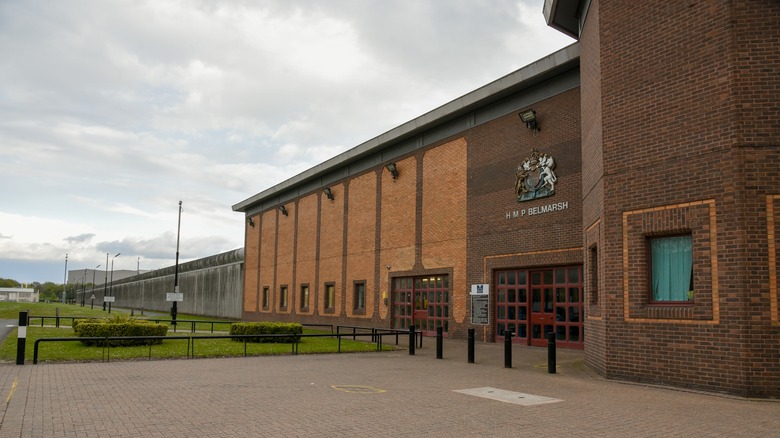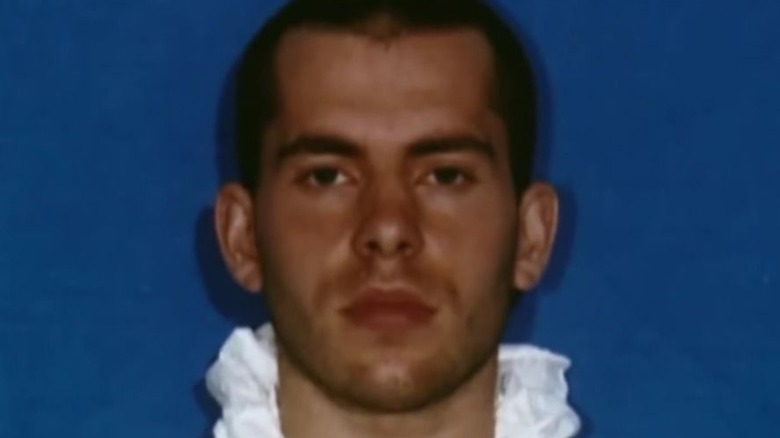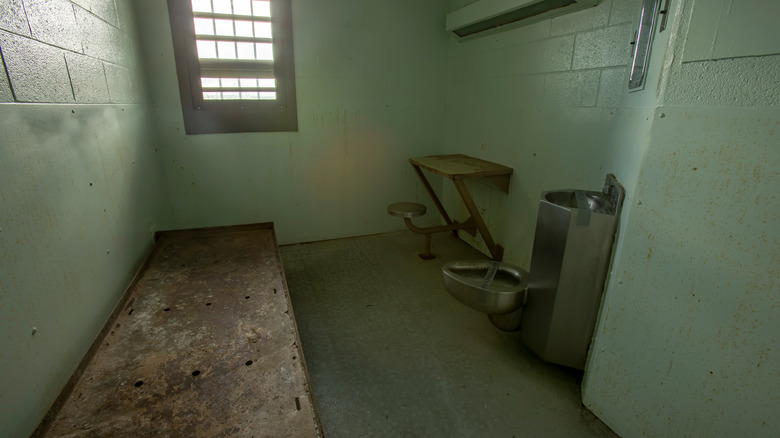Whatever Happened To The London Nail Bomber David Copeland?
In the summer of 1999, the sprawling city of London was looking forward to a summer like any other. However, over the course of 13 days in April that year, the British capital was wracked with a sense of fear not known since the bombing raids of the Blitz some half-century earlier. Beginning April 17, it was hit by a series of three homemade nail bombs, according to the BBC. The first exploded outside the famously bustling Brixton market, injuring 48 people, including an infant. An X-ray later revealed that the 23-month-old child had a nail lodged in his skull.
"When I received the call on 17 April, the first question I asked was who on earth would put a bomb in the middle of a market on a busy Saturday afternoon?" Sir Hugh Orde, who was on duty as the Metropolitan Police force commander at the time of the blast, told the BBC, adding: "My gut feeling was that the only logical explanation for this attack was racism."
Another bomb went off a week later on London's Brick Lane, the epicenter of the city's Bangladeshi community, injuring 13. The final bomb blast came on April 30 at the Admiral Duncan pub in Old Compton Street. That the pub was a gay venue confirmed police's suspicions that the attacks were motivated by bigotry. The attack killed three people: Nik Moore, 31, John Light, 33, and Andrea Dykes, 27, who was four months pregnant, according to The Guardian.
The arrest and trial of David Copeland
With the police linking the three attacks upon London's Black, Bangladeshi, and LGBTQ+ communities, attention turned to right-wing extremist groups operating in the city, with special attention being paid to the identity of a shaven-headed man who was photographed by security cameras at the site of the first blast minutes before detonation, according to the BBC. Appeals about the man were first made after the second bombing, which, it turned out, compelled him to bring the timing of the third attack forward by some days. The man was 22-year-old David Copeland, who was indeed identified by a colleague and reported to the police, who discovered Nazi flags and numerous newspaper cuttings related to his attacks on the people of London at his address. In custody, Copeland, who was diagnosed with paranoid schizophrenia, told investigators that his attacks on ethnic communities were attempts to precipitate a "racial war" in the capital (per The Guardian). Meanwhile, High Court Judge Nigel Sweeney said the bomber's attack on the Admiral Duncan pub was motivated by his "personal" homophobia.
As reported by The Independent, Copeland's trial was attended by many of the victims of his attacks, who witnessed Judge Michael Hyam describe his actions as motivated by "virulent hatred and pitiless contempt." He was given six consecutive life sentences for three counts of murder and three counts of "causing explosions in order to endanger life" on June 30, 2000, meaning he would serve a minimum of 30 years in prison (via The Guardian).
More years added
As reported by the Radio Times, London nail bomber David Copeland was initially taken to the high-security Broadmoor psychiatric hospital in Crowthorne, Berkshire, following his sentencing in June 2000. Broadmoor was also the place Copeland had received psychiatric assessment during his trial, with a consultant stating that Copeland experienced "a serious mental illness, the nature of which is psychotic and the diagnosis schizophrenia." Nevertheless, this was not considered the basis for diminished responsibility with regard to the deadly, bigotry-fueled bombings (via The Guardian).
In 2004, Copeland was relocated to HM Prison Belmarsh (via the Radio Times). Belmarsh is located in South West London and is a high-security unit known for housing "category A" prisoners who are considered highly dangerous to the public, such as Copeland (via the Howard League for Penal Reform). In 2007, former High Court Justice Michael Burton announced that under new legislation, Copeland's sentence would be extended for as long as "necessary for the protection of the public" and that the London nail bomber would more than likely serve at least 50 years in prison, according to The Guardian.
If you or someone you know needs help with mental health, please contact the Crisis Text Line by texting HOME to 741741, call the National Alliance on Mental Illness helpline at 1-800-950-NAMI (6264), or visit the National Institute of Mental Health website.
The London nail bomber appealed his sentence
Following the news that David Copeland's jail term had increased from 30 to 50 years, the self-described homophobe and neo-Nazi launched an appeal in 2011 — when he was 35 — to try and get his exceptionally long sentence reduced. High Court Judge Michael Burton, the magistrate who deemed it appropriate to add another 20 years to Copeland's prison term, deemed the original ruling appropriate as Copeland's actions constituted a "really exceptional case of deliberate, multiple murder "(via the BBC).
Few details are available publicly concerning the exact wording of Copeland's appeal, though at the 2007 extension of his sentence, it was declared that the only mitigating factor in his sentencing was his age at the time of the bombings — his mental illness was inadmissible. Still, Copeland ultimately failed in his appeal, his only one to date.
Copeland attacked a fellow prisoner
David Copeland's youth was invoked as the only mitigating factor in his sentencing — a factor that neither the judge nor the jury ultimately chose to take into account. But the fact that he was just 22 when he committed the horrific and deadly London nail bombings of 1999 could have eventually come into play in subsequent appeals if he demonstrated that age had rid him of his violent and hateful ways. However, the neo-Nazi murderer showed that he was still dangerous during a 2015 incident when he attacked a fellow Belmarsh inmate, Thomas McDonagh, in the prison exercise yard after a disagreement. Per the BBC, Copeland's attack was premeditated and culminated with the London nail bomber slashing the face of his victim with a specially-made shiv created from a toothbrush and a pair of razor blades.
Judge Anuja Dhir told the outlet: "The attack involved David Copeland running 20 meters or more across the yard with a weapon on show. He wanted to inflict a permanent reminder of what he had done — and he achieved that aim." Copeland was tackled by security and spent 11 months in solitary confinement, after which a further 18 months were added to his prison sentence. He is not expected to be released before the age of 74.




